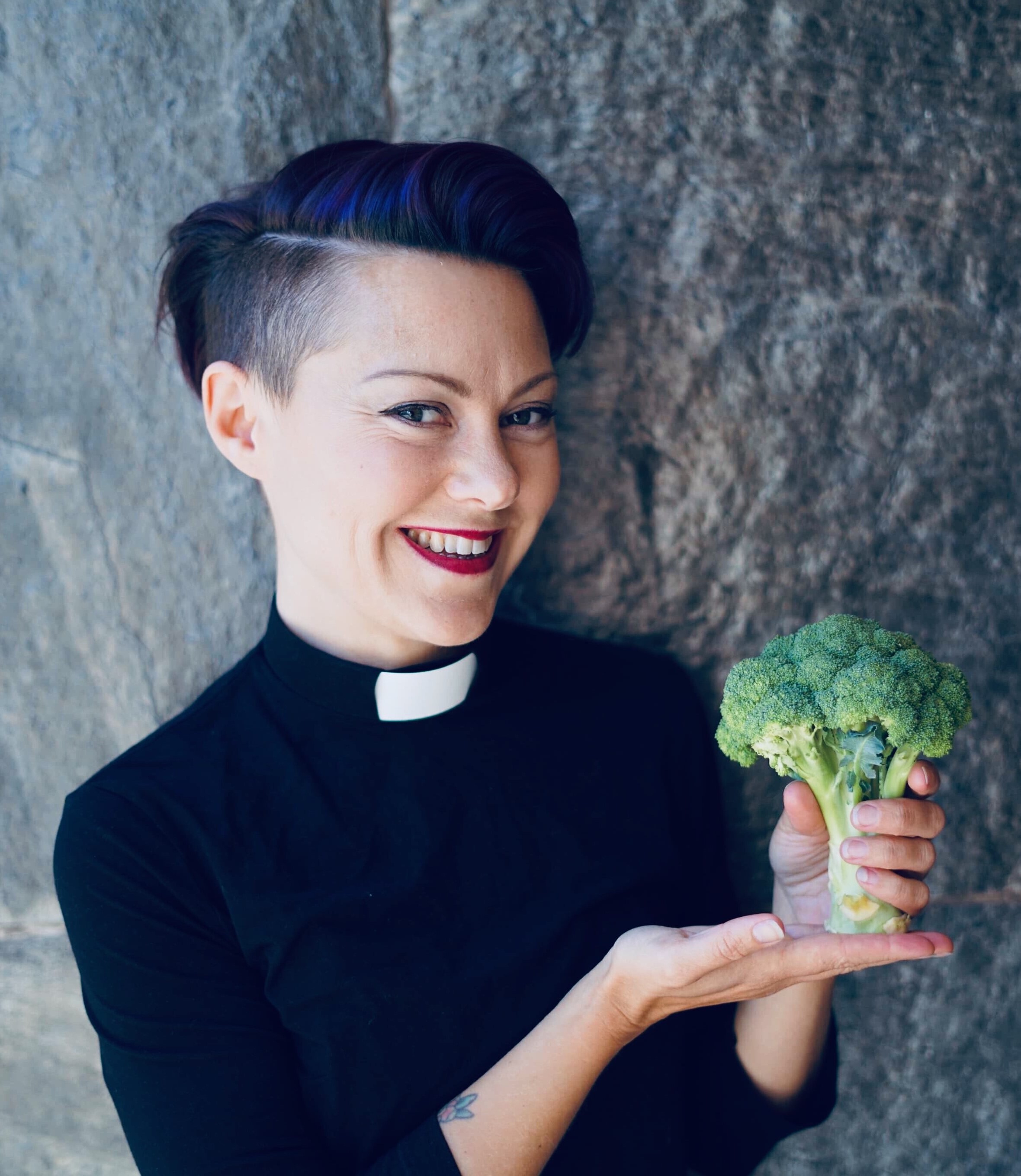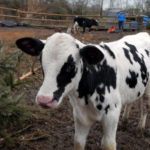It was my first day of a new job at a church in West London. During the morning break, upon being asked if I would like tea or coffee, I explained that I was a vegan and politely asked if there was any soya milk. The curate replied that there was not and, fixing me with a stern eye, said coldly “You won’t find many of those in this community”.
The extraordinary growth of veganism has been met with some stiff push back and unfortunately, as many vegans well know, such frosty encounters are becoming a common place within the workplace or among family and friends.
In reference to a 2015 US study by Cara MacInnis and Gordon Hodson[1], Matt Ball of One Step for Animals wrote that “vegans are viewed more negatively than atheists, immigrants and asexuals.” Ball added “The only group viewed more negatively than vegans were drug addicts.”[2]
As for the UK, a collaborative research report produced by the Vegan Society, The Ecologist magazine and Kingston University[3] revealed meat eaters (who were not considering going vegan) to have very negative perceptions of veganism, believing it may be “unhealthy”, “harmful to the environment” and “unnatural”. Also “social barriers such as stereotypes and abuse directed towards vegans” were listed among some of the main issues preventing people from becoming vegan.
Church communities are no haven from anti-vegan sentiment. Far from it! Since Sarx’s inception in 2014, the charity has received frequent messages and letters from people who have suffered prejudice in their churches, from anti-vegan pronouncements from the pulpit to rude comments during a Bible study or communal meal. Callous and dismissive comments from church leaders can be particularly painful and damaging and have led to Christians leaving their churches or even their faith altogether. Individuals have written in to share their experiences:
Every time I attended my small group the issue of veganism was raised and I was teased. I never once raised the issue, it was always the meat eaters who wanted to provoke and make jokes. It was like being back on a school playground.”
P from London
At the start of summer, a hog roast was planned for a church social event. I was a regular server at church events but I explained to the pastor that I didn’t feel comfort serving at a hog roast. I did however say I would help serve a vegan option if it was made available. The pastor was furious and told me ‘Jesus has made everything clean. If you want to forbid yourself from eating pork, become a Muslim.’”
S from Manchester

The Revd Canon Dr Paul Overend
Fortunately, there are an increasing number of vegan church leaders who are prepared to stand against this hostility. The ordained clergy we spoke to, crucially, bring their own experience of discrimination. The Revd Canon Dr Paul Overend[4] experienced negativity when he attempted to introduce vegan wine into Eucharist services: “as not all communion wine is vegan though some readily available communion wine is vegan, when sedimented without casein, gelatine or fish bone. I was teased a bit about this, though I felt it was important as I was actually asking to be admitted to the sacrament of the Eucharist.”. Such teasing can be a painful experience for church leaders as well as worshippers in the pews: “Such comments can make me feel marginalised and as if other people doubt my judgement because of the choices I make” said the Revd Dr Jan Goodair[5].
The Revd Lauren Ng[6] has received all the typical negative comments and considers why people make them: “Rarely do people say these things just to be mean-spirited. More often, they are inquisitive but their ignorance of the issue is received as judgment. Other times, they are defensive, feeling judged by my choices, and so they speak in a reactive, unfriendly tone.”

The Revd Lauren Lisa Ng
The Revd Dr Christopher Carter[7] feels he can empathize with the teasers, having once been one: “ I did tease people who were vegan or vegetarian when I was in my 20’s and if someone did tease me I would likely respond out of a place of kindness because I could empathize with their immaturity because I was once just like them.”
It can be challenging to understand why vegans encounter defensiveness or negativity. After all, most people hold animals in very high regard. In fact, remarkably, YouGov[8] reported that four in ten Britons say animal lives are worth the same as human lives. In the US, a study conducted in the by the nonprofit think tank Sentience Institute [SI] in collaboration with Ipsos Group, found 47% Of Americans ‘Agree With Ban On Slaughterhouses’.
So what happens when Christians who care deeply for animals, and yet eat meat, encounter vegans in the church pews? The Revd Janey Hiller[9] explains: “I think anything that has the potential to challenge an established cultural norm also has the potential to meet with resistance, defensiveness or negativity. People like to be comfortable and feel ‘right’ about their choices, and so if you say you’re vegan, they can assume that you are out to ‘get’ them or to criticize their choices.”

The Revd Janey Hiller
Jan Goodair agrees that culture plays an important role in dietary choices: “Attitudes to food are strongly culturally determined, and Christians are not exempt from those influences… because most Christian vegans ground their veganism in their faith, those who are not vegan can become defensive because they have not seen or been moved by those aspects of Christianity which lead to veganism: the vegan becomes a challenge to their own understanding of the Christian faith.”
Christopher Carter enlarges upon the notion that veganism can challenge a person’s identity as a Christian: “I think some Christians encounter defensiveness because our veganism makes them question how they practice their Christianity. Are they not “Christian enough” if they are not vegan? This is a silly question, but one that is the product of a cultural shift towards an individualistic notion of salvation that doesn’t take seriously the call by the writer of James to be a doer of the word and not merely a hearer.” Nonetheless, the fact remains that anti-vegan sentiment has caused a lot of hurt and disappointment with the church. What advice might be offered to those who feel isolated within, or indeed have left, their faith communities because of anti-vegan prejudice?

The Revd Dr Christopher Carter
Jan Goodair offers some words of encouragement: “Please don’t give up on the Church because of this. We can best bring about change from the inside. If you can find any local Christian vegans then meet and share a meal with them.” The Revd John Ryder[10] encourages Christian vegans to keep connected with likeminded people: “For people who feel isolated within or have left their faith communities because of their veganism – and I have known many – my response is first to suggest that they keep in touch with other Christian vegans, and then that they be evangelical about their Christian Veganism… If one starts with sympathetic people, a core of vegans can be created which, never mind how small, will make life and evangelism easier.”
Christian vegans seeking encouragement among likeminded people is doubtless very helpful for those individuals but what about the rest of the church? The fact is, society’s attitudes to eating meat is changing fast. A survey by Ipsos Mori, commissioned by The Vegan Society, found that the number of vegans in the UK quadrupled to 600,000 between 2014 and 2019. In May 2021, a survey revealed 1 in 4 Brits had reduced the amount of animal products they were consuming since the start of the Covid-19 pandemic.[11] Whilst the sands of change are shifting within wider society, is there a need for the church as a body to respond and what are the consequences if it does not?

The Revd Dr Jan Goodair
Jan Goodair comments “One understanding of mission is to look for what God is already doing in the world and join in. The rise in veganism – a way of life driven by compassion – must surely be considered Godly, and so vegans could be allies of the church. If the Church fails to engage it will be considered increasingly irrelevant, especially by the growing numbers of young vegans.”
John Ryder echoes this concern about the church being perceived as out of touch. Indeed, in his experience, Christians are already seen as opponents of animal advocacy. “With the growing numbers of vegans in the wider society the church will be regarded as irrelevant, especially by younger people, if they do not get a handle on Christian veganism. I can remember holding a Christian Vegetarian stall at the London Vegan Fair about 20 years ago, and people wanting me thrown out because I was a Christian.”

The Revd Jennie Högberg
For Paul Overend, a failure to engage with animal issues could result in the loss of moral authority for the church: “There is a generational shift, no doubt, in which young people judge the church to be backward and immoral in many issues, including environmentalism and animal rights. I don’t think the greatest threat is simply that we miss out on some new Christians from this generation, but that the church loses all moral authority among younger generations.”
The Revd Jennie Högberg[12] agrees with the pressing need to engage with the changing views of society; “The consequences will be that the church is viewed as backward-looking and irrelevant. Maybe also hypocritical; we talk about love and at the same time contributes to the killing of billions of innocent and sentient beings.”
The process of engaging Christians with vegan and animal issues is multi-tiered and a variety of methods can yield results. Jennie Högberg favours grassroots engagement: “I try to focus on interacting with vegans around me. Both on social media and in person. This summer I held a lecture on a vegan camp on being a minister, Christian and vegan, where most of the participants were not Christian, and some sceptical to religion overall. I shared my thoughts, my theology and my experiences and also my uncertainties. I got a lot of positive feedback. I hope I gave them a positive depiction of a vegan minister.” Jan Goodair agrees with the value of positive online and in-person interactions “I have tried to ‘pop in’ to conversation, both online and in the flesh, to say that I am a Christian and also a vegan and that a good number of us do care… I guess that the way to take it further is to grow more Christian vegans who will then take their place in the whole range of animal rights and animal welfare organizations.

The Revd John Ryder
Christopher Carter sees the need for concerted campaigns of engagement “I think the primary way things can go further is to begin campaigns centered on the idea of “thinking theologically about food.” By this I mean we need to encourage communities to reflect on what they eat, why they eat it, and if what they eat is reflective of the values they want to uphold. Theologically I connect this to sanctification, the process of becoming more Christlike. From the perspective of sanctification, we can see our diets as reflective of our past and an opportunity to shape our future to reflect the beloved community. For instance, I think all religious communities should commit to the DefaultVeg[13] program for community meals.“
Janey Hiller believes that the wider issue of creation care provides an opportunity to discuss veganism: “I have used the worldwide Season of Creation as a platform in churches to focus on various aspects of creation care, including animal welfare through interactive prayer stations, talks etc. This year, I am holding an Ethical Buying workshop. It will focus on a shopping basket of items we buy regularly in church and help people to do some thinking about how and why we might make more ethical choices. One aspect of this will be to look at the benefits of buying cruelty-free.”
For John Ryder, our animal and food issues need the serious attention of senior leaders and church council: “While things are hopeful we need to carry on awareness-raising. Together we should campaign to get this topic onto the synods of our churches.” Lauren Ng has achieved some success in this area: “My work at the national level of a mainstream denominational entity in the United States has afforded me many opportunities to help bring about deeper Christian engagement with animal issues. From socially responsible investing, to influencing the meal choices at national conferences, to offering grants to Christian animal advocacy organizations, we are effecting change little by little.”
It seems that change is vital to ensuring the ongoing relevance of the Christian voice within a wider society which is becoming ever more concerned about the way we treat animals. So what practical steps can clergy and members of Christian communities take in making churches a welcoming place for vegans?
Our vegan vicars came up with a long list of action points including ensuring there is always provision for vegans at church functions, avoiding attractions such as hog roasts during summer fairs, providing vegan wine for communion services, holding an annual St Francis Day/Animal Blessing service, welcoming local vegan groups to use their spaces for potluck suppers, running a vegan stall at a church fȇte and including animals within prayers and preaching.
Yet perhaps what is most important is a change of attitude towards God’s creatures and sensitivity for those who care for them. As Jan Goodair says, we need an extension of “the popular ‘Inclusive Church’ agenda so that it also reflects God’s love for the other-than-human animals.”
Change is no easy task. It can be a long and painful process. Yet when the church genuinely extends its circles of compassion to embrace all God’s creatures, and the vegans who advocate on their behalf, it truly will have a unique, powerful and relevant message for now and future generations.
[1] It ain’t easy eating greens: Evidence of bias toward vegetarians and vegans from both source and target – Cara C. MacInnis, Gordon Hodson
[2] Why do people hate vegans so much? Abigail Higgins
[3] The Vegan Society – Perceptions about veganism
[4] The Revd Canon Dr Paul Overend is Chancellor at Lincoln Cathedral
[5] The Revd Dr Jan Goodair is an Anglican Chaplain and Joint Area Environment Champion in the Diocese of Leeds
[6] The Revd Lauren Lisa Ng is ordained as a Minister with the American Baptist Churches, USA and currently working on her Doctor of Ministry programme.
[7] The Revd Dr Christopher Carter is Assistant Professor, Assistant Chair & Department Diversity Officer, Theology and Religious Studies at the University of San Diego
[8] YouGov Poll – Do you think that human lives are worth more, less, or the same as animal lives?
[9] The Revd Janey Hiller is an Ordained Minister and Pioneer Activist in the Anglican Diocese of Bristol.
[10] The Revd John Ryder is an Anglican priest and Chair of Christian Vegetarians and Vegans UK
[11] The Vegan Society – World Wide Statistics
[12] The Revd Jennie Högberg is a priest in the Church of Sweden who serves in the parish of Frustuna, Södermanland.
[13] DefaultVeg is an international partnership which shares the goal of changing the way organisations think about and source their food.




